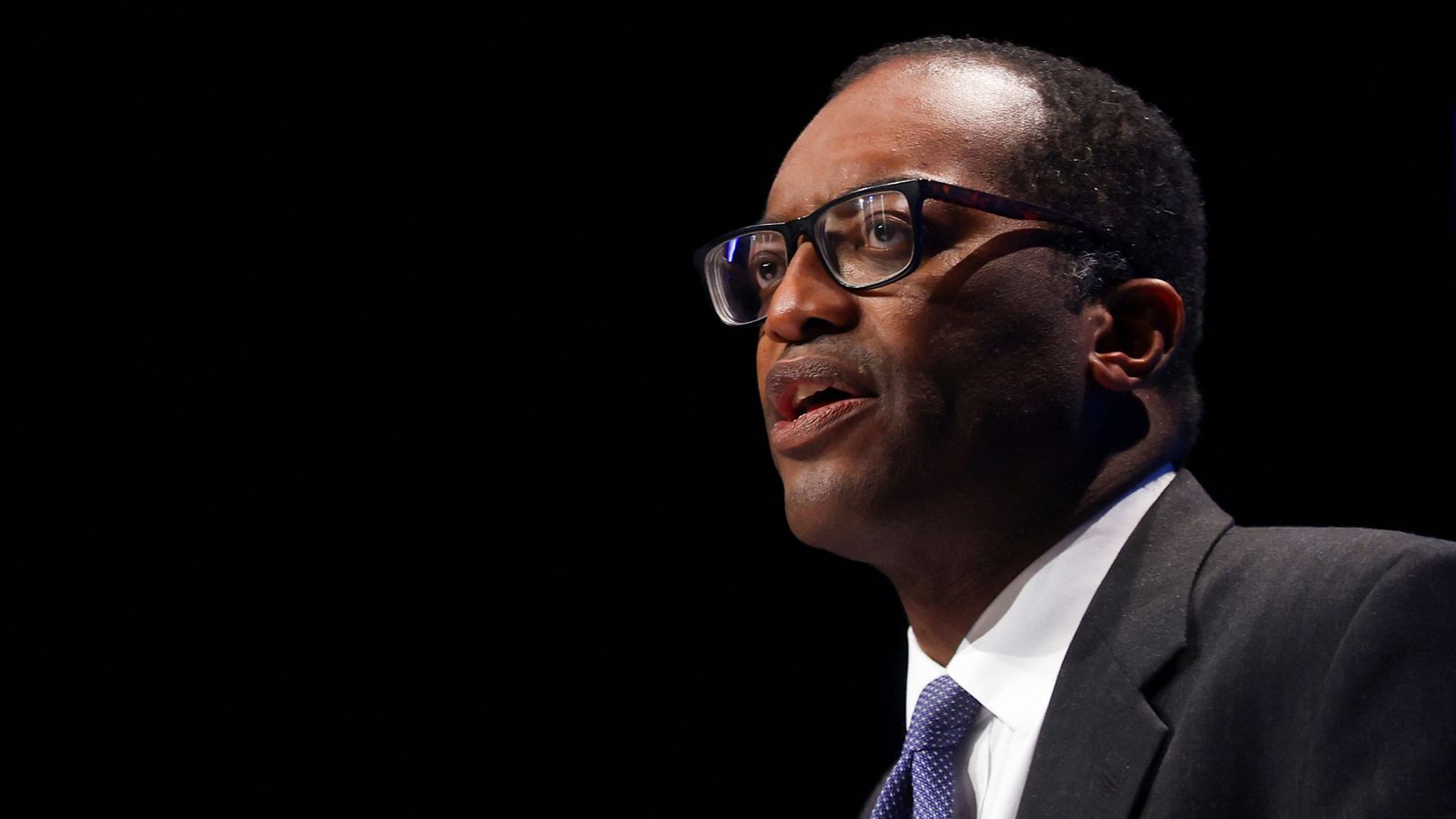Chancellor Kwasi Kwarteng insists he is ‘not going anywhere’ and is ‘totally focused’ on growth plan

The chancellor has insisted he is “not going anywhere” amid the economic turmoil in the UK and said he remains “totally focused” on delivering the government’s growth plan.
During a visit to Washington DC, Kwasi Kwarteng was asked whether he and Liz Truss, the prime minister, will be in their respective roles this time next month.
“Absolutely. 100%. I’m not going anywhere,” he said.
The chancellor admitted there has been some “domestic turbulence” since he unveiled his tax-cutting mini-budget at the end of September and the pound fell to record lows against the dollar, but said there is “a very dicey situation globally”.
Truss is out ‘and we have the numbers’, says Tory MP – politics latest
“I speak to Number 10, the PM all the time, and we are totally focused on delivering the growth plan,” he said.
Pushed on whether there will be any more reversals of policies in the mini-budget, Mr Kwarteng said: “I am totally focused on the growth agenda.”
Last week, after open revolt from Tory MPs and a surge in support for Labour in the polls, Ms Truss and Mr Kwarteng abandoned the plan to abolish the highest 45% tax rate.
Sky News understands discussions are under way in Downing Street over whether to scrap some of the contentious proposals which remain in the chancellor’s tax-cutting mini-budget.
Advertisement
The proposed changes to corporation tax and dividend tax are those understood to be under discussion.
Downing Street insisted earlier on Thursday that there will be no more U-turns on policies in the government’s tax-cutting mini-budget despite pressure from Conservative MPs for changes to be made.
Asked to confirm there would be no further reversals, the prime minister’s official spokesman said: “Yes, as I said to a number of questions on this yesterday – and the position has not changed from what I set out to you all then.”
Please use Chrome browser for a more accessible video player
2:48
Discussions happening over whether to scrap parts of the mini-budget
Ms Truss faces open revolt in her party over the £45bn package of unfunded tax cuts in the mini-budget, which unleashed chaos in the markets when it was announced last month.
The chancellor will set out his debt-cutting plan in more detail on 31 October, having bowed to pressure to bring the date forward from 23 November given the economic turbulence.
Earlier on Thursday, James Cleverly, the foreign secretary, refused to say there would be no more reversals.
He told Sky News the Halloween statement would give “a more holistic assessment of the public finances and our response to the global headwinds that every democracy, every economy in the world is facing”.
Pressed on the plan to axe the increase in corporation tax from 19% to 25% in April, Mr Cleverly said it is “absolutely right” the government helps businesses to “stay competitive” and “stay afloat”.
The Treasury had vowed to reduce the rate of income tax on dividends by 1.25 percentage points.
Please use Chrome browser for a more accessible video player
2:54
How long can Truss stay in power?
Mr Kwarteng is meeting with International Monetary Fund (IMF) leaders in Washington DC today, after the institution’s chief economist said tax cuts threatened to cause “problems” for the UK economy.
Speaking at a press conference in Washington, the managing director of the IMF said it is sometimes right for a “recalibration” of policies as she was questioned over reports of further U-turns after the mini-budget market chaos.
Kristalina Georgieva said: “Our message to everybody, not just the UK, is that at this time, fiscal policy should not undermine monetary policy.”
Read more:
What on earth is happening in UK markets?
What are bonds and where do they fit in the mini-budget crisis?
Meanwhile, in a post on social media on Thursday, former Conservative chancellor George Osborne questioned why Ms Truss and Mr Kwarteng would wait for the chancellor’s statement on 31 October to perform an “inevitable U-turn” on their mini-budget.
Please use Chrome browser for a more accessible video player
1:32
Tories ‘must get back to being fiscally responsible’
On Wednesday, Mel Stride, the Tory chairman of the Commons Treasury Committee, said that given Ms Truss’s commitments to protect public spending, there was a question over whether any plan that did not include “at least some element of further row back” on the tax-slashing package can reassure investors.
While David Davis, the Tory former minister, called the mini-budget a “maxi-shambles” and suggested reversing some of the tax cuts would allow Ms Truss and Mr Kwarteng to avert leadership challenges for a few months.